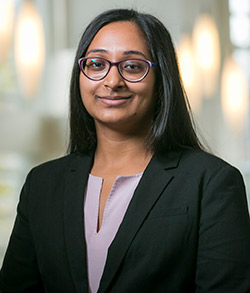Patel ’18 receives Skadden Fellowship to serve LGBTQ and HIV-affected Staten Islanders
 Kinjal Patel ’18 has received a two-year Skadden Fellowship to provide legal assistance to low-income lesbian, gay, bisexual, transgender, queer (LGBTQ), and HIV-affected residents of Staten Island, N.Y.
Kinjal Patel ’18 has received a two-year Skadden Fellowship to provide legal assistance to low-income lesbian, gay, bisexual, transgender, queer (LGBTQ), and HIV-affected residents of Staten Island, N.Y.
Patel will join Staten Island Legal Services (SILS) in offering representation to these clients on such matters as health-related legal issues, government benefits, name and gender-marker changes, housing, immigration, family law, and discrimination. Her work will include targeted outreach to low-income and vulnerable clients through on-site legal clinics and information sessions at social service agencies, among other initiatives.
One of 29 graduating law students and judicial clerks nationwide to be awarded the prestigious public interest-focused fellowship for 2018, Patel is the second Duke Law recipient in as many years. Olivia Cole ’17, whose fellowship supported work with a veterans’ assistance organization in San Francisco, advised Patel through the Skadden Foundation’s application process.
“I am honored and grateful for all the help I got in applying for the fellowship,” said Patel, offering thanks to Cole and others, including Dean David F. Levi, Assistant Dean for Public Interest and Pro Bono Stella Boswell, Clinical Professor Allison Rice, Katharine Bartlett, the A. Kenneth Pye Professor of Law, and Government and Public Interest Career Counselor Bethan Eynon for their advice, recommendations, and interview practice. “I couldn’t have done it without Duke.”
Patel, who worked with HIV-affected individuals and victims of domestic and sexual violence before law school, has carefully laid the groundwork for a career in public interest law at Duke, developing her skills through clinics, externships, summer work, and pro bono service. She has held summer positions as a legal intern at the Boston Area Rape Crisis Center and at the Women’s Law Project in Philadelphia, and has been a leader in Duke Law’s Coalition Against Gender Violence and as a volunteer at the Durham Crisis Response Center. In the Health Justice Clinic last spring, she handled cases involving disability, estate planning, advance directives, and family law for clients, and in the fall semester represented survivors of gender-based violence during an externship at Honeycutt Everett & Associates, a nonprofit law firm in Durham.
Patel, who will work in the International Human Rights Clinic during her final semester at Duke Law, will be among the first students to graduate with the Law School’s Certificate in Public Interest and Public Service Law.
Rice, who directs the Health Justice Clinic and recommended Patel for the Skadden Fellowship, had high praise for her dedication and attention to detail in pursuing her clients’ interests, as well as the legal and interpersonal skills she demonstrated in doing so. “Kinjal developed trusting relationships with her clients, many of whom were facing extremely stressful situations,” said Rice. “She learned how to process clients’ distress and trauma without either detaching or crumbling. She also showed that her solid legal analysis, writing, and advocacy skills were not undermined by the emotional nature of the cases.”
Rice also noted Patel’s understanding of the roles poverty, race, class, gender, and health play in creating obstacles to justice: “Her appreciation of the barriers facing the LGBTQ and HIV populations in connection with health and other issues will serve her well, both in handling individual cases and in planning the most effective strategies for collaborating with the program’s partner agencies.”
On Staten Island, those barriers are often exacerbated by societal stigma, discrimination, and lack of sensitivity from service providers, Patel said. A dearth of service providers and a poor transportation infrastructure can often pose additional obstacles to care as well as related legal services, she added.
In addition to offering regular on-site legal clinics at community organizations that partner with SILS, Patel plans to cultivate additional partnerships and draw on her pre-law experience in using non-traditional means to reach potential clients who may not be connected to formalized community organizations. During an undergraduate internship at the Los Angeles AIDS Project, Patel would sometimes engage in outreach to clients at nightclubs in the wee hours of the morning, and as a research assistant at Boston Children’s Hospital, she helped recruit HIV-positive participants for a community-based intervention through ads on dating websites and Craigslist.
Patel will become the only attorney in the borough of Staten Island with a full-time practice devoted to the legal needs of LGBTQ and HIV-affected clients, populations that are distinct but sometimes overlap. “There are many issues that are unique to those communities that require sensitivity and a holistic approach in order to catch everything that a client might need,” said Lorilei Williams, director of immigration and LGBTQ/HIV advocacy at SILS, who noted that the agency currently handles immigration, name change, and Medicaid matters for these clients, but refers many other questions to outside service providers. “We want to do more for them. We want to be able to fully represent them.”
The stigma faced by LGBTQ and HIV-positive residents of Staten Island presents a challenge to fulling assessing their needs and the demand for legal services, Williams added. “There’s a lot of work to be done to help people come out of the woodwork and feel safe doing so, in a climate with a lot of racism, homophobia, and transphobia.”
Said Patel: “I’m grateful to SILS and to the Skadden Foundation for giving me the opportunity to close some gaps in services Staten Islanders face.”